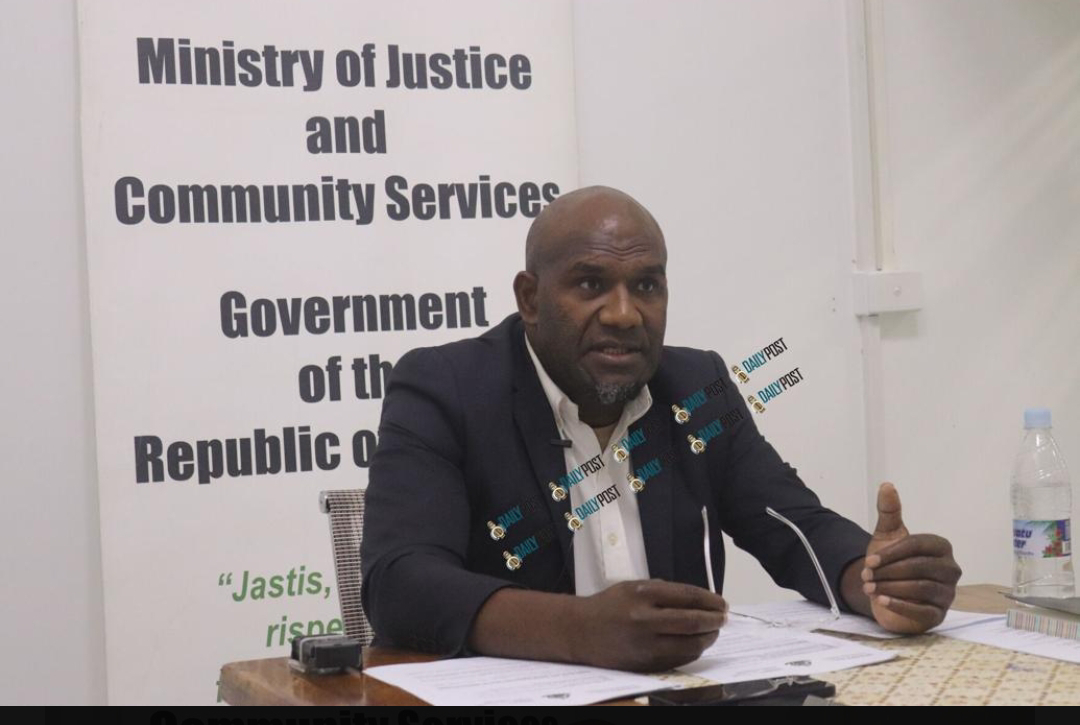The Government of Vanuatu has taken a firm stance against the promotion and advocacy of Lesbian, Gay, Bisexual, Transgender, Queer or Questioning, Intersex, Asexual, and others (LGBTQIA+) rights, following a Council of Ministers (COM) decision on 18 April 2024.
In Decision No. 163, the COM ruled that the Republic of Vanuatu will not encourage or support any LGBTQIA+ activities, including those funded by development partners or Non-Governmental Organisations (NGOs).
The decision was made during the Council’s ninth ordinary meeting, with the government citing that LGBTQIA+ practices are in conflict with the country’s Christian principles and Melanesian values, which are embedded in Vanuatu’s Constitution.
The government emphasised that these values must guide the moral standards of the nation.
The Ministry of Justice and Community Services (MoJCS) has been tasked with preparing a national policy to clarify the government’s position on the matter. A working committee, comprising church leaders and chiefs, will be formed to draft the policy, ensuring it reflects the views of Vanuatu’s rural and urban communities.
Human Rights Coordinator Albert Nalpini, under the MoJCS, stated that the decision aligns with the foundational values of Vanuatu, mentioning the principles of Melanesian custom and Christian values are deeply ingrained in the preamble of the Constitution and this is the benchmark of morality in Vanuatu, and the government has made its position clear on this issue.
He said the government is not targeting individuals but addressing specific actions it considers immoral. While all citizens are accepted as members of the community, Nalpini stressed that the government’s focus is on regulating behavior that it deems inappropriate for Vanuatu’s society.
The decision follows a 2018 Memorandum of Agreement (MOA) signed by key national organisations, including the Vanuatu Christian Council, Malvatumauri Council of Chiefs, National Youth Council, and Vanuatu Women’s Centre.
These groups opposed LGBTQIA+ advocacy and urged the government not to entertain such activities. This agreement played a substantial role in shaping the current COM ruling.
“The work of the Ministry of Justice now is to develop a national policy. The Minister has issued a letter to its partners to form a working committee, where the committee will develop a concept note. From this concept note, we will create a nationwide policy to guide us in accordance with the COM decision,” said Nalpini.
“I am asking our partners and stakeholders, whom the Minister has requested to participate in the working committee, to collaborate and develop a policy that can support and protect our people, children, and youth, and those who understand the issue.”
He added, “If we look at rights, there are one or two that we call absolute rights, which means we cannot change them, legislate them, or frame them—one of which is the right to live. A person has no right to take away someone’s life.
The rest of the rights that exist can be framed in legislation, and as a sovereign state, we can decide which rights to accept and which not to accept.
“That’s the whole reason why we criminalise certain moral activities that we consider immoral. For example, fighting someone, in our understanding, is an immoral act, so we draw a line and say fighting is not acceptable.
“If the government feels that certain actions are not accurate, then the government will legislate to draw a line. To the partners that support such activities, when the government, which represents the people and drives national policy, sets a direction, we must all comply with that direction.
The churches and chiefs are the main stakeholders in the committee we want to establish. Since they represent the majority of the communities in remote rural areas, as well as at the national level, they are the ones who speak about the standard of morality in our nation, which is reflected in our preamble. This is the principle on which our founders built our country.”
He concluded that Vanuatu’s approach treats every child involved in the issue as a child of the nation, regardless of their background or identity.
The government’s focus is solely on the actions it considers inappropriate, not on the children themselves.
All children of Vanuatu are accepted as part of the nation. However, the behaviours addressed by the COM have been firmly ruled upon. Despite this, these children continue to be part of their respective nasaras, churches, communities, and Vanuatu as a whole.
The decision has drawn attention from both local and international observers, as it clearly outlines Vanuatu’s official stance on LGBTQIA+ rights.
For now, the government’s focus remains on upholding its interpretation of morality based on the country’s Christian and Melanesian heritage.



No comments:
Post a Comment